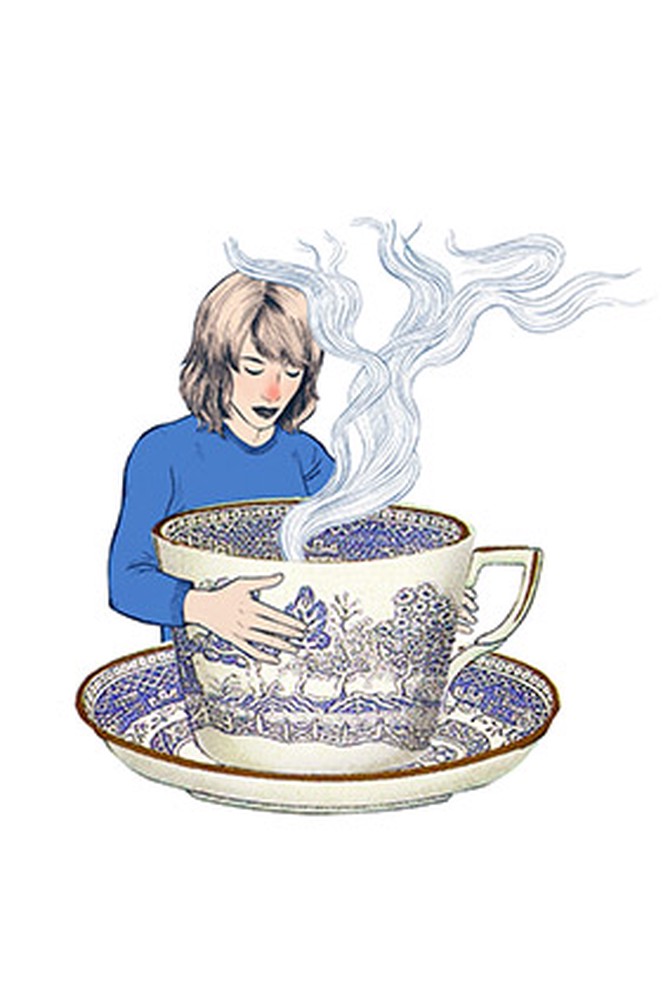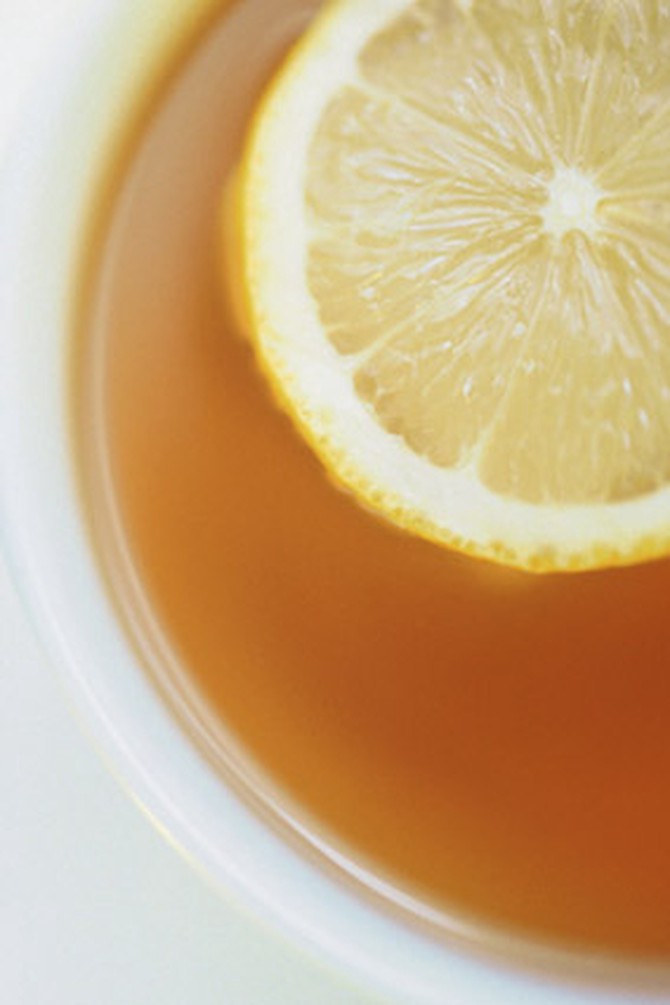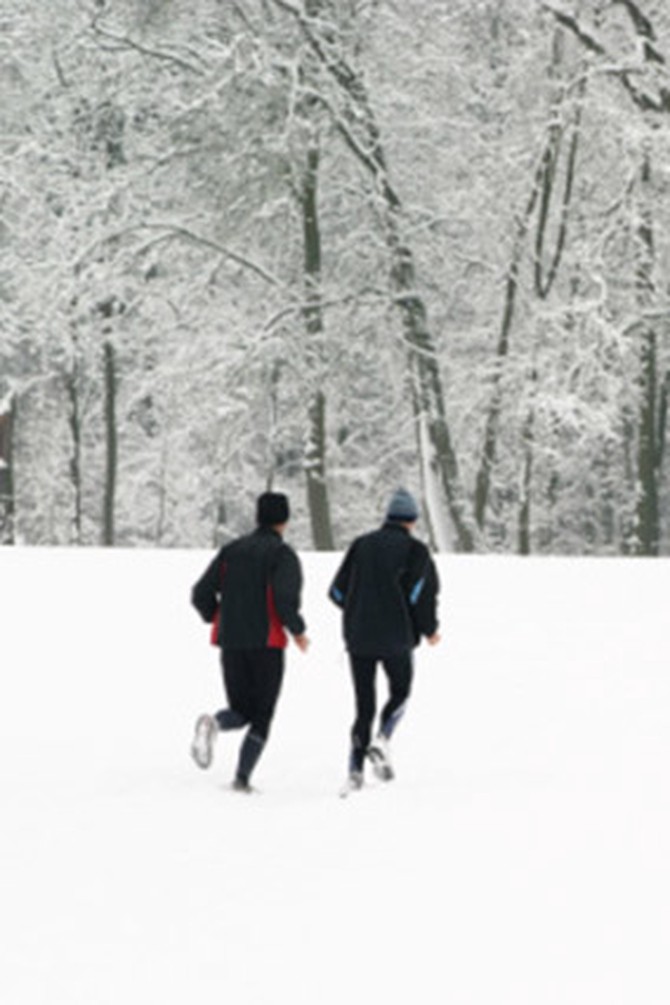How Doctors Stay Healthy Through the Winter
Experts answer four common cold weather questions.
By Amanda Schupak

Illustration: Silja Götz
When the snow starts falling and the sniffles start spreading, you might wonder if small, everyday decisions really make a difference in your health. Turns out, they do. We asked doctors to weigh in on these wintertime quandaries to help you make the right choice, every time.
If you feel a cold coming on, should you drink tea or orange juice?
"There's no question that tea is the better choice. Yes, orange juice has vitamin C, but it may actually suppress your immunity and make you more susceptible to colds because of its high sugar content. According to one study, when you consume 100 grams of carbohydrates in the forms of glucose, fructose, sucrose, orange juice, or honey, you significantly reduce the function of white blood cells that contribute to a healthy immune system. So while it's important to drink lots of fluids, stay away from fruit juices. Plus, hot tea clears the nasal passages. Pour a cup—and get your C from a vitamin."—Michael T. Murray, naturopathic doctor and coauthor of The Encyclopedia of Natural Medicine
If you feel a cold coming on, should you drink tea or orange juice?
"There's no question that tea is the better choice. Yes, orange juice has vitamin C, but it may actually suppress your immunity and make you more susceptible to colds because of its high sugar content. According to one study, when you consume 100 grams of carbohydrates in the forms of glucose, fructose, sucrose, orange juice, or honey, you significantly reduce the function of white blood cells that contribute to a healthy immune system. So while it's important to drink lots of fluids, stay away from fruit juices. Plus, hot tea clears the nasal passages. Pour a cup—and get your C from a vitamin."—Michael T. Murray, naturopathic doctor and coauthor of The Encyclopedia of Natural Medicine

Photo: Thinkstock
Speaking of tea, which is better: tea with milk or tea with lemon?
"I wouldn't recommend milk. Studies have shown that the protein it contains counteracts some of tea's health benefits. In my lab we've shown that separately, caffeinated green tea and a high-protein diet can boost metabolism and burn fat. But when we combined them, milk protein lessened the good effects of green tea on metabolism and long-term weight management. We believe the protein binds to the tea's antioxidant polyphenols, making them less available for your body to use."—Rick Hursel, PhD, Department of Human Biology at Maastricht University, The Netherlands
"I wouldn't recommend milk. Studies have shown that the protein it contains counteracts some of tea's health benefits. In my lab we've shown that separately, caffeinated green tea and a high-protein diet can boost metabolism and burn fat. But when we combined them, milk protein lessened the good effects of green tea on metabolism and long-term weight management. We believe the protein binds to the tea's antioxidant polyphenols, making them less available for your body to use."—Rick Hursel, PhD, Department of Human Biology at Maastricht University, The Netherlands

Photo: Thinkstock
It's 2 P.M. on a busy Saturday and you're falling asleep on your feet—but you're only halfway through your holiday shopping list. Go home and take a nap or push through and turn in early?
"Don't go to bed earlier than usual. You should follow the same schedule every night, including weekends, so you don't mess with your circadian clock and disrupt your regular sleep rhythm. Take a ten- to 15-minute snooze (your car will do if you're far from home), then keep shopping. That's all you need to rejuvenate and get through the rest of the day. Sleeping for 60 minutes would leave you groggy, and since 90 minutes is typically a full REM cycle, napping for that long would likely make it hard to fall asleep at your normal bedtime."—James B. Maas, PhD, author of Power Sleep, former chair of psychology at Cornell University, and coiner of the term "power nap"
"Don't go to bed earlier than usual. You should follow the same schedule every night, including weekends, so you don't mess with your circadian clock and disrupt your regular sleep rhythm. Take a ten- to 15-minute snooze (your car will do if you're far from home), then keep shopping. That's all you need to rejuvenate and get through the rest of the day. Sleeping for 60 minutes would leave you groggy, and since 90 minutes is typically a full REM cycle, napping for that long would likely make it hard to fall asleep at your normal bedtime."—James B. Maas, PhD, author of Power Sleep, former chair of psychology at Cornell University, and coiner of the term "power nap"

Bundle up for a winter jog or wear just enough to keep from shivering?
"You should dress as if it's 15 to 20 degrees warmer outside than the actual temperature. It will be chilly at first, but you'll warm up. If you're overdressed, you can overheat, leading to excessive sweating, which can cause leg cramps and put you at risk for hypothermia. For very cold days, I recommend pants or tights, a moisture-wicking top, a hat, and gloves. And a windbreaker is a must—it'll keep out the chill if the temperature drops."—Elizabeth G. Matzkin, MD, surgical director of the Women's Sports Medicine Program at Brigham and Women's Hospital
Next: Dr. Oz's 7 secrets to stay cold-free all winter
"You should dress as if it's 15 to 20 degrees warmer outside than the actual temperature. It will be chilly at first, but you'll warm up. If you're overdressed, you can overheat, leading to excessive sweating, which can cause leg cramps and put you at risk for hypothermia. For very cold days, I recommend pants or tights, a moisture-wicking top, a hat, and gloves. And a windbreaker is a must—it'll keep out the chill if the temperature drops."—Elizabeth G. Matzkin, MD, surgical director of the Women's Sports Medicine Program at Brigham and Women's Hospital
Next: Dr. Oz's 7 secrets to stay cold-free all winter
From the December 2012 issue of O, The Oprah Magazine

